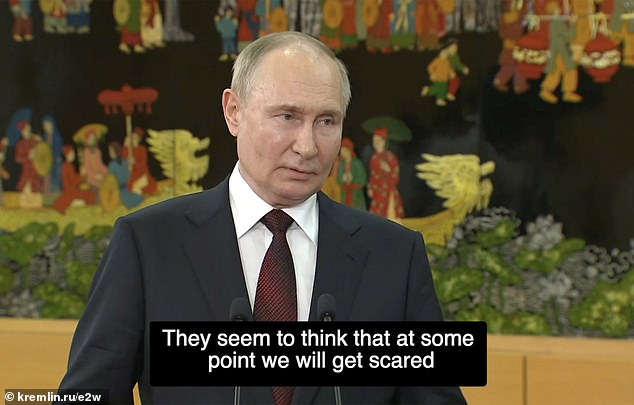Vladimir Putin has vowed to go “all the way” on the battlefield in Ukraine and declared that the Kremlin could review its doctrine on the use of nuclear weapons in the face of perceived Western aggression in an alarming new interview.
Speaking at the conclusion of a pair of state visits to North Korea and Vietnam this week, the Russian president accused kyiv’s Western partners of further raising tensions by giving the green light to the use of NATO weapons against targets on Russian soil. .
The bellicose Kremlin chief also accused Western countries of “lowering the threshold” for using nuclear devices against Russia, an accusation for which he provided no evidence.
These alleged developments led the 71-year-old autocrat to conclude that Moscow must now consider updating its nuclear doctrine in preparation for an atomic war, announcing that defeat in Ukraine would mean “the end of Russian statehood.”
‘It means the end of the 1,000-year history of the Russian state. I think this is clear to everyone… Isn’t it better to go to the end, to the end?’ he asked her rhetorically.
The disturbing interview came just hours before Ukraine launched one of the largest drone attacks against Russia, setting fires at a pair of oil fields and an air base.
The Russian president accused kyiv’s Western partners of further raising tensions by giving the green light to the use of NATO weapons against targets on Russian soil.
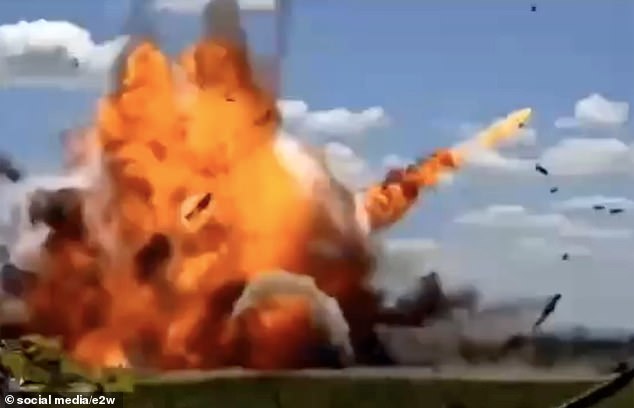
A Russian tank explodes after a Ukrainian drone attack in this undated clip
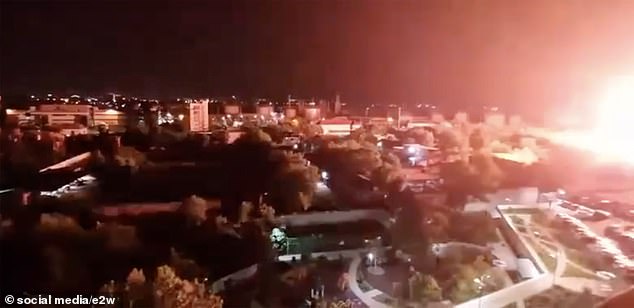
A fireball is seen lighting up the night sky in Russia after a Ukrainian drone attack.
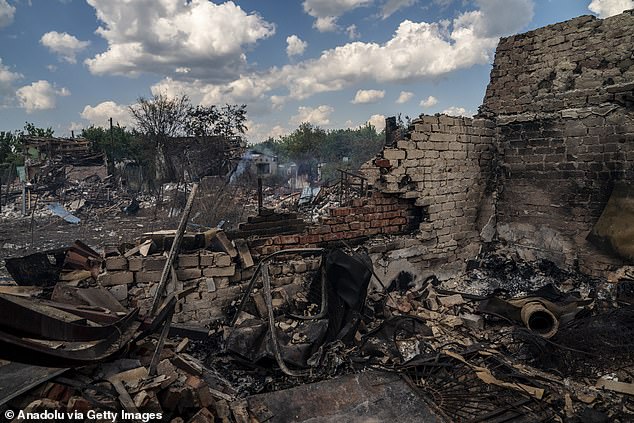
A view of the destruction of a house on the Kostyantynivka front as the war between Russia and Ukraine continues in Donetsk Oblast, Ukraine, June 20, 2024.
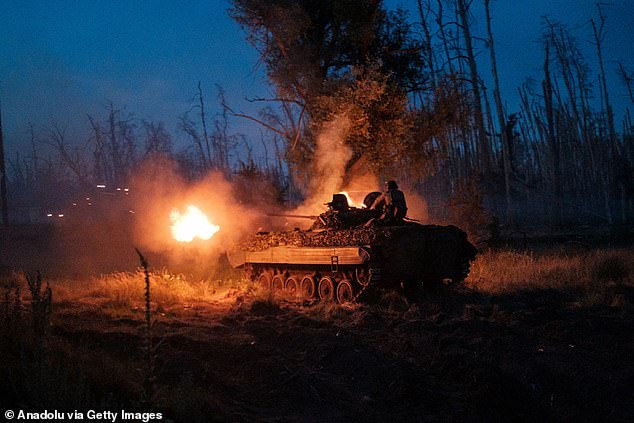
The 1st National Guard brigade ‘Bureviy’ fires a tank while carrying out a mission in a BMP-2 to fire on Russian positions in the Serebryanskyy forest in Luhansk, Ukraine, June 19, 2024.
Putin, speaking just days after signing a comprehensive strategic partnership with nuclear pariah state North Korea, said the United States, the United Kingdom and other Western partners are “constantly raising the stakes and aggravating the situation” around Ukraine.
‘They seem to think that at some point we will get scared. But at the same time, they also say they want to achieve a strategic defeat of Russia on the battlefield,” he said, adding that this would mean the end of the Russian Federation as it is known.
‘And then the question arises: why should we be afraid? Isn’t it better to go to the end, to the end? This is elementary formal logic…
“I think those (in the West) think that way, and even more so those who say it, are making another big mistake.”
He then went on a tirade about the West’s alleged willingness to deploy tactical nuclear weapons against Russia, warning that this could lead the Kremlin to re-examine its own nuclear doctrine.
It was last updated in 2020, two years before the outbreak of war in Ukraine.
Existing doctrine allows Russian forces to deploy nuclear weapons if their enemies use weapons of mass destruction against the Federation or its allies, or if Moscow receives credible information that an attack is about to occur.
However, the doctrine also allows the Kremlin to resort to atomic weapons if an enemy “threatens the existence of the Russian state” with the use of conventional weapons, a worrying clause given Ukraine’s willingness to attack targets on Russian soil with equipment provided by NATO. .
“We know that the potential adversary is working on it, in connection with lowering the threshold for the use of nuclear weapons,” Putin said.
“We are thinking about what could be changed in nuclear doctrine.”
When asked whether Ukraine’s use of long-range Western weapons against Russian territory could be considered an act of aggression, the Kremlin chief responded with a disturbing comment.
“This requires additional research, but it’s close.”
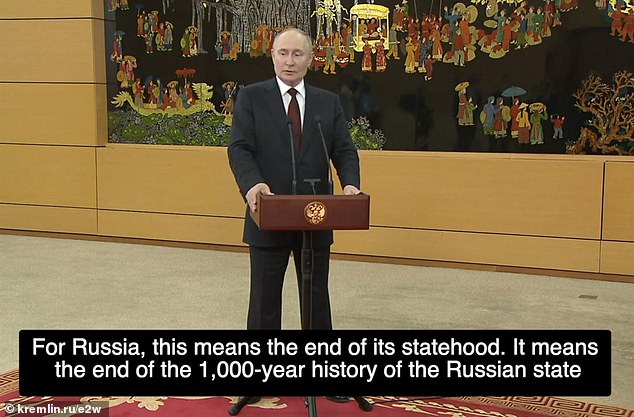
Putin said defeat in Ukraine would mean “the end of the Russian state”
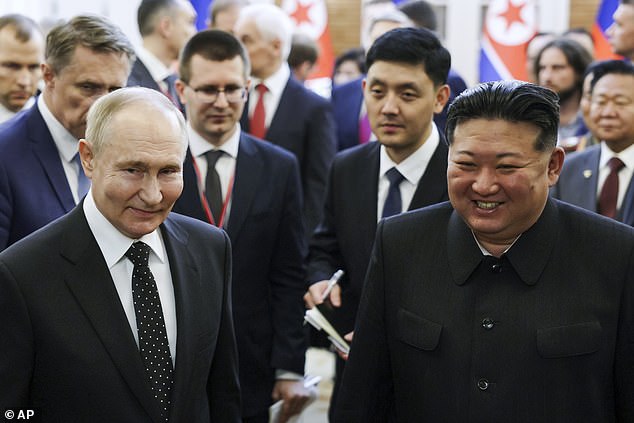
Russian President Vladimir Putin, left, and North Korean leader Kim Jong Un smile as they walk after talks in Pyongyang, North Korea, Wednesday, June 19, 2024.
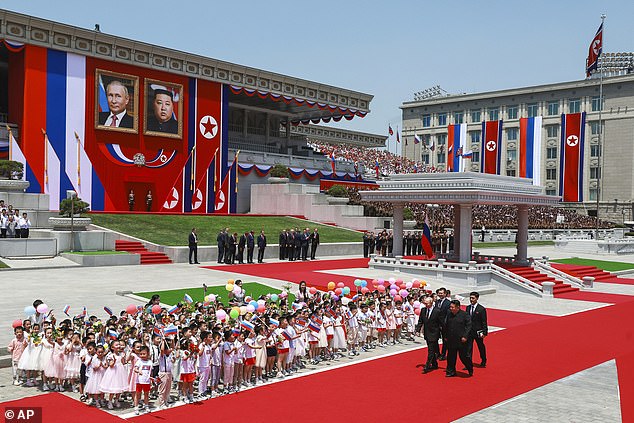
Russian President Vladimir Putin, left, and North Korean leader Kim Jong Un, right foreground, attend the official welcoming ceremony at Kim Il Sung Square in Pyongyang, North Korea, Wednesday 19 June 2024.
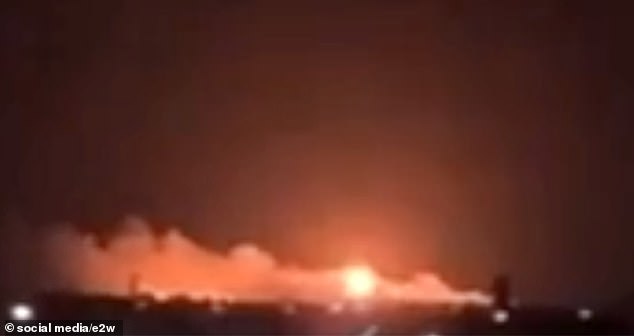
Footage taken of a burning oil tank in the distance after a Ukrainian airstrike
Putin’s interview with reporters came hours before Ukraine unleashed one of its most intense kamikaze drone attacks against Russian targets in the war yet.
The drones hit two targets in the Krasnodar region: the Yeysk air base and the Ilsky oil refinery, as well as a major oil depot in Volgograd.
The Ilsky refinery is one of the main fuel producers in southern Russia, with the capacity to refine 6.6 million tons of crude oil (132,000 barrels per day) per year.
The head of the local district, Andrei Doroshevsky, said this morning on the Telegram messaging app that the fire was finally brought under control.
“Tonight, the civilian infrastructure of our region came under massive attack by the criminal regime in kyiv,” he said, adding that a drone also damaged administrative buildings at the Ilsky oil refinery.
The plant had already been attacked by drones in February.
Russian defense officials claimed that kyiv sent a total of 119 Ukrainian air and sea kamikaze drones.
Six of them were unmanned ships, they said, which have proven extremely effective in the conflict, having sunk several ships of the Russian Black Sea Fleet.
On the other hand, regional authorities reported that fires were put out in oil depots in the Tambov and Rostov regions.
In recent months, kyiv has been responding to key Russian targets in response to relentless drone and missile attacks by Moscow’s forces that have caused widespread devastation in Ukraine and crippled its energy sector.

